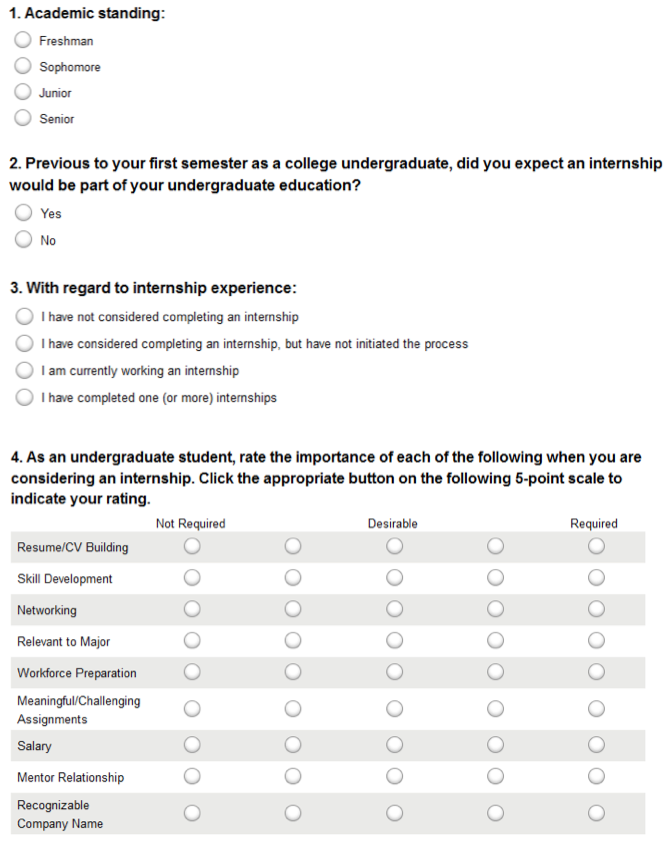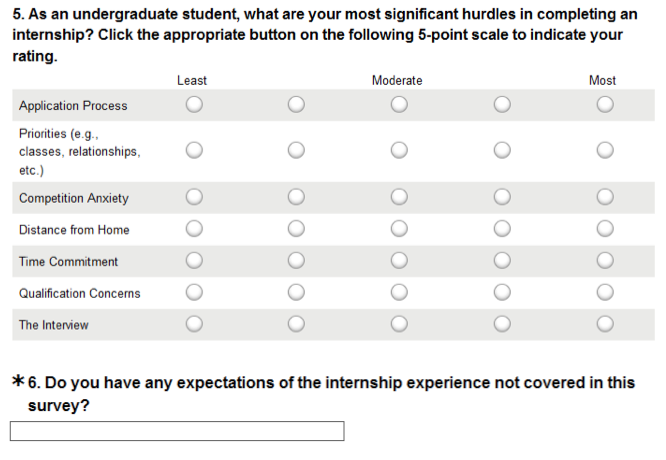Undergraduate Internship Expectations: Strategic Encouragement of Student Involvement
By
2013, Vol. 5 No. 12 | pg. 2/2 | « Study 2Results of the focus group showed that a majority of undergraduates are enthusiastic about the internship process, but are unsure of where to start. Several undergraduates who expected an internship to be part of their education indicated they had not initiated the process due to their lack of clarity on how to do so. One female undergraduate said, “An internship is definitely something I find extremely valuable to my education because of work experience. There needs to be a more structured way to get internships.” As focus group members began to speak up about this issue, several others agreed and elaborated. Generally, the consensus of the focus group was that they did not know where to go or who to talk to regarding the initiation process. One male student specifically expressed a need for a designated person or place to go for help with internships. The focus group sparked the idea that undergraduates would be pursuing internships if they had guidance about where to start. As part of the focus group, respondents expressed a desire for a competitive internship program that could offer them an environment to grow and become more qualified to work in the professional world. A different female undergraduate from the one first referenced said, “There should be competition to get internships because there is competition when it comes to getting a real job.” Another female undergraduate who had already completed an internship shared, “The challenge is what got me to develop my skills. It is important to have a little bit of challenge in an internship so you can actually learn something new. Still, if you don’t get enough support from your supervisors or coworkers, developing is hard.” Those surveyed, and particularly those who were part of the focus group, desired to be prepared for life after college. They wanted to feel qualified to do the job they had studied so hard for during their undergraduate career. The results of both studies show undergraduates want a place to start, a place to go where qualified people can guide them in the right direction, in the direction toward a well-matched internship that will prepare them for that first job after graduation, or better yet, a career.DiscussionOur findings suggest undergraduates value internship experiences. Internships are considered beneficial because they provide opportunities for skill development and networking opportunities. Through internships, undergraduates receive live workforce training that better prepares them for their future after college. Interns are also able to design (for the application process) and supplement (with experience) a useful résumé for their post-graduation job search. Our survey showed most who participate in internships prefer internship opportunities related to their major, to not only intensify their education, but gain relevant work experience in their field of study. A notable discrepancy was highlighted by the results of our carefully constructed survey questions. There is a distinct misalignment between the number of potential undergraduates who see internships as part of their future and current undergraduates actively seeking or participating in internships. Specifically, prior to beginning college, 50.0% of the undergraduates we surveyed expected an internship to be part of their undergraduate career, however, only 19.4% were either currently involved or had already completed an internship (see Figure 1, Appendix B). This sparked a question. Considering both interest and expectation are present, why are more undergraduates not engaged in the internship process? Our UIE survey, as particularly elaborated on by our undergraduate focus group, revealed both that internships are incredibly valued and that many are reluctant to initiate the process. The initial application process, qualification concerns, and competition anxiety hinder undergraduate motivation to initiate internships preventing them from this opportunity to gain valuable work experience. Motivation and encouragement via mentors and convenient access to information related to availability of appropriately fit internships may facilitate undergraduates taking that first key step. Internships require investment and, as made clear in this study, for many, this investment first requires support. It is clear undergraduates value internships for the varied benefits, but would appreciate more guidance in internship matching, application, and mentor support. While further research is required to answer this question, a defined location and person designated to discuss internship possibilities will support undergraduates and, potentially, encourage greater involvement. With such a mentor, undergraduates would be able to better navigate hurdles and discuss priorities with the benefit of making them feel more confident about engaging in the internship process. Generally, based on the results of the current study, an internship program designed to be competitive, minimize the impact of undergraduate reported hurdles, and maximize the benefit of undergraduate reported priorities, all while maintaining support from institutional faculty and staff would ultimately increase undergraduate internship engagement. Specifically, we recommend, (a) making internships part of the undergraduate educational commitment, (b) an institutionally supported application process (e.g., career service involvement in resume drafting, interview preparation, and internship matching) and, (c) incorporating networking and mentoring into the internship program. Active undergraduates balance coursework, plan for their futures, and maintain active social lives. During this time, although of perceived benefit, these undergraduates may not have the motivation to take part in the internship experience. Given the potential benefit, college and university support faculty and staff should encourage the interest that is already present and cultivate internship experiences precisely aligned with career goals. Future research may reveal that, as colleges become more actively involved in encouraging undergraduates to participate in internships and mentoring them through the intimidating initiation process, both participation and benefit may increase. This increase may be in both reality and perception which will, consequently, help motivate each incoming class. AcknowledgementsWe would like to acknowledge Sierra Nevada College for supporting our research with their generous grant. We would also like to acknowledge Dr. Steve Ellsworth for his assistance with the data analysis conducted as part of this project. ReferencesAmerican Accounting Association. (1952). Report of the Committee on Internship Programs. The Accounting Review, 7, 316-323. Billitteri, T.J. (2009). The value of a college education: Is a four-year degree the only path to a secure future?. CQ Researcher, 19(41), 981-1004. Retrieved from http://library.cqpress.com.sierranev.idm.oclc.org/cqresearcher/document.php?id=cqresrre2009112000&type=query&num=undergraduate+internships& D’Abate, C.P., Youndt, M.A., & Wenzel, K.E. (2009). Making the most of an internship: An empirical study of internship satisfaction. Academy of Management Learning & Education, 8(4), 527-539. Freestone, R., Williams, P., Thompson, S., & Trembath, K. (2007). A quantitative approach to assessment of work-based learning outcomes: An urban planning application. Higher Education Research & Development, 26(4), 347-361. Green, B.P., Graybeal, P., & Madison, R.L. (2011). An exploratory study of the effect of professional internships on students’ perception of the importance of employment traits. Journal of Education for Business, 86, 100-110. Huddy, S., Frederick, C. M., Burns, M.K., Aitkenhead, J. (2013, July 18). Results of research on undergraduate internship experience. The Eagle’s Eye, p. 2. National Association of Colleges and Employers (NACE). (2011, May 25). Students likely to accept job offer from internship employers. Retrieved from http://www.naceweb.org/s05252011/intern_hire_conversion/?referal=knowledgecenter&menuid=112 The Washington Center (TWC). (2010). Internships: Frequently asked questions. Retrieved from http://www.twc.edu/internships/frequently-asked-questions/internships Westerberg, C., & Wickersham, C. (2011). Internships have value, whether or not students are paid. The Chronicle of Higher Education. Retrieved from http://chronicle.com/article/Internships-Have-Value/127231/ Zupek, R. (2013, May 20). Top 10 reasons employers want to hire you. Retrieved from: http://www.cnn.com/2009/LIVING/worklife/11/02/cb.hire.reasons.job/ Appendix
Suggested Reading from Inquiries Journal
Inquiries Journal provides undergraduate and graduate students around the world a platform for the wide dissemination of academic work over a range of core disciplines. Representing the work of students from hundreds of institutions around the globe, Inquiries Journal's large database of academic articles is completely free. Learn more | Blog | Submit Latest in Education |
















